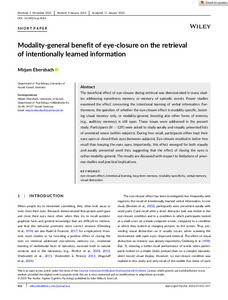Modality-general benefit of eye-closure on the retrieval of intentionally learned information
| dc.date.accessioned | 2023-03-27T11:52:16Z | |
| dc.date.available | 2023-03-27T11:52:16Z | |
| dc.date.issued | 2023-01-23 | |
| dc.identifier | doi:10.17170/kobra-202303277710 | |
| dc.identifier.uri | http://hdl.handle.net/123456789/14535 | |
| dc.description.sponsorship | Gefördert im Rahmen des Projekts DEAL | ger |
| dc.language.iso | eng | |
| dc.rights | Attribution-NonCommercial-NoDerivatives 4.0 International | * |
| dc.rights.uri | http://creativecommons.org/licenses/by-nc-nd/4.0/ | * |
| dc.subject | eye-closure effect | eng |
| dc.subject | intentional learning | eng |
| dc.subject | long-term memory | eng |
| dc.subject | modality-specificity | eng |
| dc.subject | verbal memory | eng |
| dc.subject | visual distraction | eng |
| dc.subject.ddc | 150 | |
| dc.title | Modality-general benefit of eye-closure on the retrieval of intentionally learned information | eng |
| dc.type | Aufsatz | |
| dcterms.abstract | The beneficial effect of eye-closure during retrieval was demonstrated in many studies addressing eyewitness memory or memory of episodic events. Fewer studies examined the effect concerning the intentional learning of verbal information. Furthermore, the question of whether the eye-closure effect is modality-specific, boosting visual memory only, or modality-general, boosting also other forms of memory (e.g., auditory memory), is still open. These issues were addressed in the present study. Participants (N = 129) were asked to study aurally and visually presented lists of unrelated nouns (within-subjects). During free recall, participants either kept their eyes open or closed their eyes (between-subjects). Eye-closure resulted in better free recall than keeping the eyes open. Importantly, this effect emerged for both visually and aurally presented word lists, suggesting that the effect of closing the eyes is rather modality-general. The results are discussed with respect to limitations of previous studies and practical implications. | eng |
| dcterms.accessRights | open access | |
| dcterms.creator | Ebersbach, Mirjam | |
| dcterms.extent | 452-457 | |
| dc.relation.doi | doi:10.1002/acp.4044 | |
| dc.subject.swd | Augenschließen | ger |
| dc.subject.swd | Langzeitgedächtnis | ger |
| dc.subject.swd | Verbales Gedächtnis | ger |
| dc.subject.swd | Ablenkung | ger |
| dc.type.version | publishedVersion | |
| dcterms.source.identifier | eissn:1099-0720 | |
| dcterms.source.issue | Issue 2 | |
| dcterms.source.journal | Applied Cognitive Psychology | eng |
| dcterms.source.volume | Volume 37 | |
| kup.iskup | false |
Dateien zu dieser Ressource
Das Dokument erscheint in:
-
Artikel [1169]


